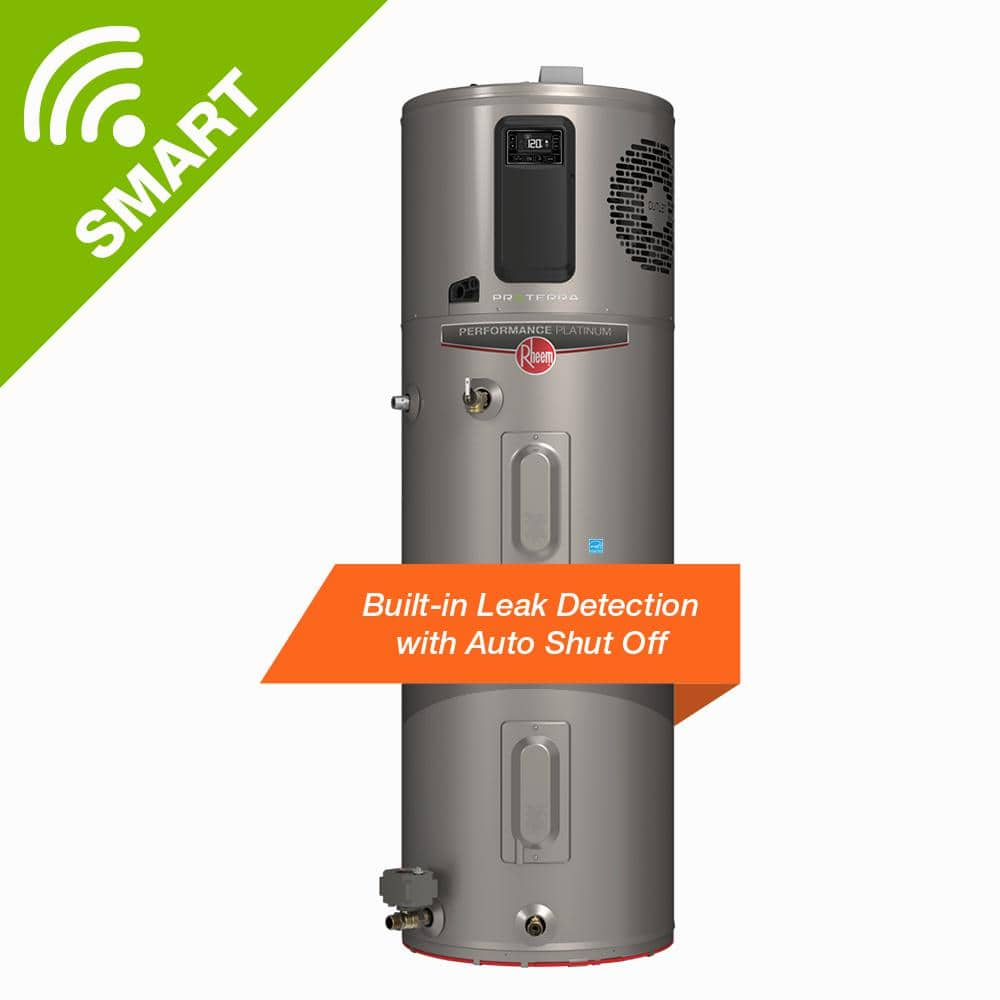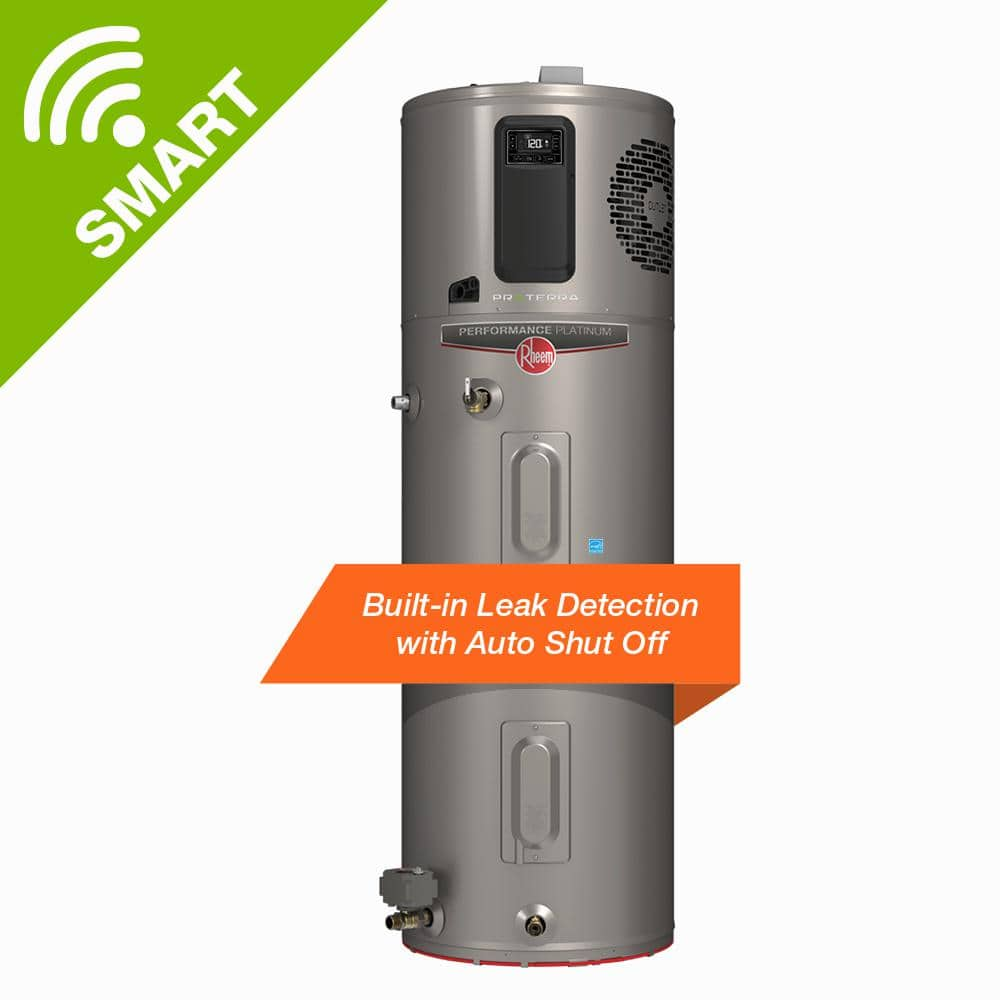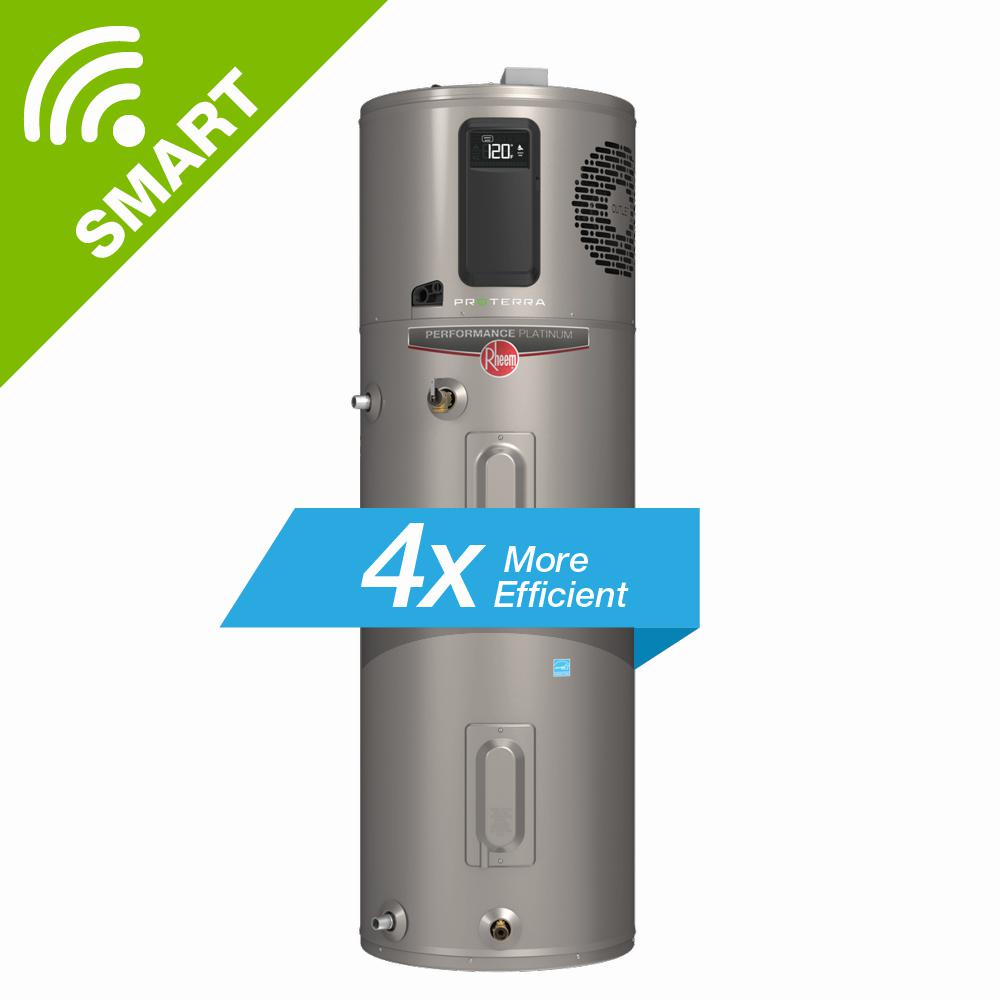Rheem ProTerra 80 Gal. 10-Year Hybrid High Efficiency Smart Tank Electric Water Heater with Leak Detection & Auto Shutoff
Hybrid electric heat pump saves up to $460 in annual energy costs. Auto Shutoff Valve protects your home from potential water damage. Provides ample hot water for homes with 3+ bathrooms / 5+ people.
The Rheem ProTerra Electric Hybrid is the smartest, quietest and most efficient water heater on the market. It features a hybrid heat pump design making it 400% more efficient than standard electric water heaters. It’s so efficient, it pays for itself in 2-3 years and has an estimated energy cost savings of up to $4,600 over 10-years. This ProTerra hybrid model features LeakGuard, the integrated the 360° leak detection system and the auto shut-off valve system that shuts off incoming water, locks water in the tank and protects your home. It’s smart: with its built-in WiFi and the EcoNet app, you can check hot water availability, track energy usage and can control its modes; choose the efficiency or performance you want. As Performance Platinum, it comes with a 10-year warranty and 1-year in-home labor warranty.
- Provides an estimated energy cost savings of more than $460 per year
- Pays for itself in 2-3 years thanks to an amazing 4.00 uniform energy factor and features that deliver long-term savings
- Protects your home from potential water damage with LeakGuard, the 360° leak detection system and the auto shut-off valve that shuts off incoming water and locks water in
- Smartest: built-in EcoNet Wi-Fi technology allows you to manage hot water and avoid cold showers; track weekly, monthly & yearly energy usage; and manage heating schedule your mobile device
- Flexible: select the efficiency or performance you want with modes such as High Demand Mode to provide more hot water when needed. There’s even a Vacation Mode to save energy and costs when you’re away.
- Save even more with Energy Star rebates: it’s Energy Star certified so it may be eligible for rebates in your area. Check for rebates through your state and local government or electric utility provider
- Sustainable: reduces Carbon footprint with 75% reduction in energy use
- Demand Response Ready: if your utility requires a grid connection, connect without any additional costs and save more with Off-peak Scheduling
- More hot water: provides more hot water than many standard residential electric models providing ample hot water for households with 5+ people or homes with 3+ bathrooms
- Easy installation: easily accessible electrical junction box for convenient hook up and drop-in replacement for nearly any standard electric water heater
- Ductable: Duct colder exhaust air into your attic, another room or out of your home
- Easy to maintain: premium brass drain valve for easy draining and stainless steel elements that prevent buildup
- Warranty: 10-year warranty with 1-year in-home labor warranty
- Savings & efficiency information is located on Product Specification documents
- As with any WiFi connected device, for best performance use your phone or tablet to check the Wi-Fi signal strength in the area where the water heater will be installed prior to purchase.
Additional information
| Kilo Watt | 4.5 |
|---|---|
| Product Depth x Height x Width (in.) | 24.25 x 75 x 24.25 |
| Tank Valve Size (in.) | 0.75 |
| Water Connection Size (in.) | 0.75 |
| Certifications and Listings | UL Listed |
| Labor Warranty | 1 Year |
| Part Warranty | 10 Year |






by Thome
My all elec AO Smith was 15+ years old and I wanted a more efficient solution (plus there was rust showing telling me it was time). Found this Rheem 80G Pro Terra Hybrid Unit on sale at HD. After checking the heights in my mech room I ordered this unit and hired a local plumber to install with Pro Press copper. Unit fired up and the first warm up was all elec coils and heat pump. Holds 120degF easily. The app is weak and glitchy for the first 48 hours. One false alarm on day #2 for a water leak and the safety valve closed like a clam. Cleared the alarm and runs well ever since. We use about 220 gallons total water each day and estimate 120+ HW of that total. Fluctuating in Energy Saver mode and I can see the spike when elec coils called to work. Rheem should have their own app as there is no explanation of the sequence of operations when either elec coil is asked to work. I realized my house using two + long showers while kitchen cooking is the peak. The instructions call for a pan which prevents service to the leak rope sensor when following their installation instructions. I chose the hard pipe connections as the braided soft connection tend to be the weak point. This unit does make noise and is like a larger fridge in my living room directly above the heater. I knew this in advance so this should not be a mystery to you when buying this unit. Very tolerable if you expect it. Pulls the room down 5 deg F and less humid during this summer. A better app or control board would show the three sensors and indicate when the coils are running. Or better yet show tank temperature at the low med high point. This current model is excellent and I recommend it highly for those who need to change their current elec unit. Do hire a plumber unless you own a pro press kit. I could have done this myself however the value speed and peace of mind makes a good plumber worth it. It is a two person install. A friend has the AO Smith version and it is too noisy. I don’t think of this as a payback period although I will see a refund of $400 from my utility company and a $300 fed tax credit this year. I see this as cost avoidance at 200am on a weekend if I waited any longer.
by Eric
Hot Water heater works well and was easy to setup up. There are many ways to control the unit. The install is a little more difficult than a standard water heater, requiring movement of the supply lines and install of a condensation waste line. The unit is taller and much heavier than a standard water heater and requires enough air volume to supply the heat. This will not work in all install locations. A large utility room or open basement with easy access will work well.
by Anya
I’ve had this unit a little over a month. very efficient. was not aware that it would make as much noise as it does in heat pump mode. since it located in a closet near our bedroom I just set to run in electric mode from 9pm til 7am. little hot water being used at that time anyway.
by Dave
Easy set-up to save money. You’ll have to buy your own leak sensor, my energy company doesn’t offer any rebates at this time, but I’m still saving.
by Lizzy
This was a great purchase. Replaced a gas water heater with this as it is almost 1/3rd the energy cost. It is a little bit noisy when it operates, but as a by product it air conditions our garage. The app is functional, but not as full featured as I would like it.
by Craig
Awesome. Saves money and keeps my garage much cooler too.